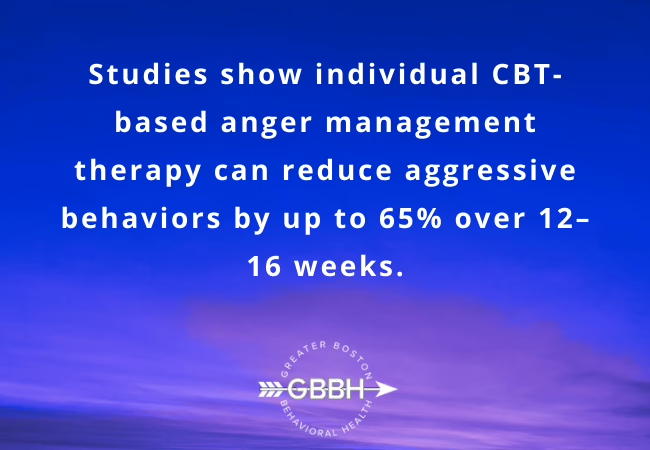When anger begins to take control of your life—hurting relationships, damaging your career, or eroding your self-respect—the most important step you can take is seeking help. But help comes in different forms, and one of the first decisions you’ll need to make is: Should you choose individual anger management therapy or group anger management therapy?
Both formats offer powerful, evidence-based paths to healing. Both help you learn emotional regulation, healthier communication, and deeper self-awareness. Yet they offer different experiences, benefits, and challenges depending on your needs.
At Greater Boston Behavioral Health, we specialize in Anger Management Therapy in Boston, offering both individual and group therapy options as part of our comprehensive Mental Health Programs in Boston, including IOP, PHP, Residential Treatment, and outpatient care.
In this guide, we’ll take you deeply into the differences between group and individual therapy—so you can choose the path that supports your success.
Why Professional Help for Anger Matters
Before deciding between group or individual therapy, it’s critical to understand: Unmanaged anger doesn’t go away on its own. It intensifies. Chronic anger can lead to:
- Broken relationships with loved ones and colleagues
- Workplace conflicts, HR complaints, or job loss
- Health problems like hypertension, insomnia, and heart disease
- Legal troubles stemming from aggressive incidents
- Substance use as a maladaptive coping mechanism
- Depression, guilt, and worsening self-esteem
The earlier you seek help, the greater the chance of not just managing anger—but transforming it into emotional strength, resilience, and growth.
What Happens in Individual Anger Management Therapy?
Individual therapy offers a private, confidential space to explore your anger deeply, guided by a licensed professional.
At Greater Boston Behavioral Health, sessions are customized to meet your specific emotional, relational, and professional needs.
Focus areas include:
- Exploring the roots of anger (e.g., childhood experiences, trauma, attachment wounds)
- Identifying personal emotional triggers and escalation patterns
- Learning highly individualized emotional regulation strategies
- Healing underlying anxiety, depression, PTSD, or substance use fueling anger
- Practicing cognitive restructuring techniques to shift distorted thinking
- Building personalized relapse prevention plans
Modalities we often incorporate:
- Cognitive Behavioral Therapy Boston (CBT)
- Dialectical Behavior Therapy in Boston (DBT)
- Trauma-focused therapies (e.g., EMDR, Internal Family Systems if needed)
- Mindfulness-Based Cognitive Therapy (MBCT)
Deep Advantages of Individual Therapy
Safe Exploration of Sensitive Issues
You can talk openly about private trauma, family dynamics, or deep-seated fears without the vulnerability of a group setting.
Customized Learning Pace
Therapy proceeds at your unique speed. If certain topics trigger overwhelm, the therapist adjusts strategies accordingly.
Focused Trauma Healing
If anger stems from significant trauma, betrayal, abuse, or abandonment, individual therapy allows targeted healing without pressure to “keep pace” with others.
Building a Strong Therapeutic Alliance
A one-on-one bond with your therapist becomes a safe model for emotional safety, trust, and new relationship templates.
Crisis Intervention Readiness
If anger is leading to crises (legal issues, relationship collapse, professional risk), individual therapy can move quickly into stabilization and emergency support.
What Happens in Group Anger Management Therapy?
Group therapy brings together individuals who share a common goal: learning to control anger, express emotions healthily, and rebuild relationships. Groups are professionally facilitated by licensed therapists trained to maintain safety, respect, and growth-focused environments.
Focus areas include:
- Learning foundational anger management skills in a structured curriculum
- Practicing communication strategies through role-playing
- Identifying shared emotional triggers and behavioral patterns
- Building emotional resilience in interpersonal settings
- Receiving constructive peer feedback and support
Group therapy is offered through:
- Anger management group tracks in Intensive Outpatient Program in Boston (IOP)
- Structured groups within Partial Hospitalization Program in Boston (PHP)
- Specialized outpatient anger management groups at our Mental Health Treatment Center Boston
Deep Advantages of Group Therapy
Real-Time Social Skill Practice
You learn not just internally—but externally—by navigating emotions in real interactions with others.
Normalizing the Experience of Anger
Hearing others’ struggles reduces shame and isolation: “I’m not the only one who struggles with this.”
Witnessing Hope and Progress
Seeing group members improve reinforces the belief that change is possible for you, too.
Accountability and Motivation
Weekly check-ins, shared exercises, and group encouragement keep you committed to change.
Diverse Perspectives on Anger
You gain insight into different coping styles, relational dynamics, and emotional experiences, deepening your self-understanding.
Individual vs. Group Therapy: A Side-by-Side Comparison
| Aspect | Individual Therapy | Group Therapy |
|---|---|---|
| Privacy | Full confidentiality | Shared confidentiality agreement within the group |
| Focus | Deep personal history and emotions | Skill-building through shared experiences |
| Pace | Completely personalized | Structured curriculum pace |
| Cost | Generally higher per session | More affordable option |
| Social Interaction | Minimal during session | Integral to therapy experience |
| Ideal for | Deep trauma, complex anger, private concerns | Practicing skills in real interpersonal settings |
When to Choose Individual Therapy First
You should consider starting with individual therapy if:
- You have a trauma history involving violence, neglect, or severe emotional wounds
- You experience intense shame, guilt, or emotional dysregulation when discussing anger
- You feel unsafe or highly anxious sharing personal stories in group settings
- You need urgent crisis stabilization (e.g., divorce threat, job at risk, legal involvement)
- Co-occurring disorders (depression, PTSD, anxiety) exacerbate your anger
When Group Therapy May Be the Better First Step
You might thrive in group therapy if:
- You feel motivated and encouraged by peer support
- You need help practicing communication and emotional regulation skills in social settings
- You appreciate structured learning formats (workbooks, group exercises)
- You’re comfortable learning alongside others with shared goals
- You want a more affordable or flexible option to start anger management work
Benefits of Combining Individual and Group Anger Management Therapy
Many individuals experience the most profound emotional transformation by combining both types of therapy:
Advantages of a Combined Approach:
-
Depth + Practice: Individual therapy helps explore personal history and trauma, while group therapy offers real-world practice of emotional regulation.
-
Customized Healing: Therapists tailor individual work based on insights gained from group experiences (and vice versa).
-
Maximized Skill Reinforcement: You apply skills learned in individual sessions immediately within group dynamics, strengthening emotional resilience.
-
Peer Support + Personalized Care: You gain the motivation of community AND the depth of private emotional work.
At Greater Boston Behavioral Health, we often recommend a blended therapeutic journey for sustainable, whole-person anger management success.
What to Expect in Your First Group or Individual Therapy Session
First Individual Therapy Session:
-
Comprehensive emotional assessment (history, anger patterns, trauma if applicable)
-
Goal-setting for anger management and emotional growth
-
Introduction to basic coping tools like mindfulness, reframing, and emotional tracking
-
Establishment of a safe, supportive therapeutic alliance
First Group Therapy Session:
-
Introduction to group guidelines (confidentiality, respect, participation expectations)
-
Overview of the anger management curriculum and skill themes
-
Sharing of motivation for joining (optional and voluntary)
-
First lessons on identifying anger triggers and basic emotional regulation strategies
-
Supportive group discussion to begin building trust and connection
At Greater Boston Behavioral Health, first sessions are welcoming, non-judgmental, and structured—designed to set you up for success from day one.
Many Clients Do Both: Building a Holistic Healing Journey
Often, the best results come from combining both formats over time:
- Phase 1: Begin with individual therapy to stabilize, heal trauma, and build foundational skills.
- Phase 2: Transition into group therapy for skill reinforcement, accountability, and interpersonal practice.
At Greater Boston Behavioral Health, we work collaboratively with you to design a dynamic, evolving treatment plan based on your growth.
Why Greater Boston Behavioral Health?
- Clinical excellence in CBT, DBT, Trauma Therapy, and Psychiatric Care
- Multiple levels of care—Outpatient, IOP, PHP, Residential
- Highly trained group facilitators maintaining safe, growth-focused group spaces
- Trauma-informed, culturally sensitive, LGBTQIA+ affirming therapy
- Personalized attention to your individual needs and relational healing goals
We understand that every emotional recovery journey is unique—and we’re honored to walk it with you.
Conclusion
Whether you choose the deep individual exploration of one-on-one therapy or the community healing and skill-building of group therapy, the most important step is saying: I deserve better. My relationships deserve better. My future deserves better.
At Greater Boston Behavioral Health, we empower individuals to reclaim emotional control, rebuild trust, and live more connected, fulfilling lives. Take the first step today. Call (888) 278-0716. You have the power to heal—and you don’t have to do it alone.
FAQ on Group vs. Individual Anger Management Therapy
Which is more effective: group or individual anger management therapy?
Both can be highly effective. The right choice depends on your personal comfort level, emotional needs, social support preferences, and whether you have complex trauma that needs one-on-one attention.
What are the benefits of starting with individual therapy?
Individual therapy provides a private, customized space to work on deep emotional wounds, trauma, or complex anger patterns before entering a group setting for skill reinforcement.
Is group anger management therapy confidential?
Yes. Group members sign confidentiality agreements, and sessions are led by trained therapists who enforce privacy and respect among participants.
Can I do both individual and group therapy at Greater Boston Behavioral Health?
Absolutely. Many clients begin with individual therapy, then transition to group work—or attend both simultaneously—to strengthen skills and achieve deeper healing.
What if I have social anxiety? Should I still try group therapy?
If social anxiety is significant, starting with individual therapy may feel safer. However, gradual participation in group therapy can eventually help reduce social fears while building emotional regulation skills.


